 |
20 Feb: Gibraltar |
 |
20 Feb: Gibraltar |
England in the Mediterranean
The flight from Gatwick landed in Gibraltar at noon. The cabin door slide open, and I felt the warm heat of the Mediterranean immediately. What a relief from cold, greyish London ! As I stepped out of the plane, I saw the Rock - this huge trademark of one of the British Empire's last possessions rising almost vertically from the edge of the airport.
The Rock of Gibraltar - That massive, isolated boulder that sticks out like a sore thumb near (not on, as many had thought) the southern tip of the Iberian Peninsula has always a role in history much greater than countless other lesser known peaks and mountains in the region and elsewhere. It was here that the Islamic Empire first landed in Europe. In 711 AD, the Visigothic Count Julian of Ceuta on the northern coast of Morocco invited the Muslim Berber warriors to attack his rivals across the Straits (of Gibraltar) in Spain. And so Tariq ibn Ziyad, chief of the Berbers in Tangier launched an attack on Algeciras (Spanish town across the Bay) but failed. He landed in Gibraltar instead and from there the Arabs went on to overrun most of Spain and Portugal. This huge rock and the town below were then named Jibel Tariq, or Tariq's Mountain in Arabic. With time, like most invaders of other lands, the British struggled to spell and pronounce the exotic places they had taken over, and so we have come to know the territory as Gibraltar.

In any case, the Arabs ruled this thumb of a rock for the next 700 years
until the Spanish expelled the Arabs in their Reconquest of the Iberian
Peninsula. Their stay was not for long, for they were in turn expelled
in 1704 by Anglo-Dutch forces, who, like good Europeans of those days (and
still do these days) meddle in the affairs in other countries, had come
in aid of their pretender to the Spanish throne. Intervention in those
days drop by in the name of restoring the "rightful sovereign" of the land,
whereas these days they call themselves "peace-keeping force" and came
for "humanitarian reasons" or to evaluate "foreign nationals". Well, their
pretender lost but Gibraltar was transferred to British sovereignty under
the Treaty of Utrecht in 1713. Neat deal.
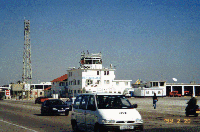
Gibraltar's only link to the Mainland cuts across the airport |
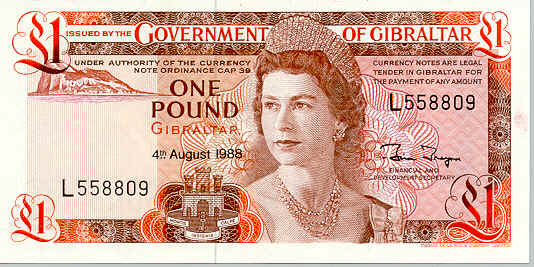
The Gibraltar Pound: Outside the territory, it is worth slightly less than a "normal" pound sterling. |
Clearing the customs was easy. The airport was small and I picked up my backpack without problems. The tourist information staff was friendly too. First impressions count. Great place, I thought. I walked across the airport runway which cut across the narrow isthmus linking Gibraltar to the Spanish Mainland - traffic has to stop whenever a plane lands. There's a queue leading to the border checkpoint. I have arrived in Gibraltar at the height of a quarrel with Spain.
In recent weeks, the Spanish government had accused the Gibraltarian government of harassing its fishermen and in retaliation, threatened to withdraw recognition of Gibraltarian driving permits and revoke the right of planes flying over Spanish airspace to reach Gibraltar. The Gibraltarians had earlier arrested Spanish fishermen who use nets that kill small fish and dolphins in contravention of environmental laws, and they felt that the actions of the Spanish Government were part of a plot to force Britain to cede Gibraltar to Spain. As a show of strength, the Spanish have tried one of the oldest tricks of border harassment - implement full textbook style customs checks - cars crossing the border were examined very carefully and slowly - perfectly legal actions in international law. Given Gibraltar's tiny size, these have resulted in atrocious traffic jams that stretched all the way to the city centre. They have also resulted in much frustrations and anti-Spanish sentiments. This was the state of affairs during my visit. Once again, historical passions have come into play.
It didn't take long to find Emille Hostel, where they charge Stg. 10 for a dom bed and Stg. 15 for a room. Dumped my luggage and set off for a walk around town. Down Main Street, I found myself in what could be High Street Hammersmith, Bradford or Norwich. Marks & Spencers, Boots, Body Shop and even Indian provision shops and curry restaurants. The only difference being the language - even though the locals speak BBC English to the foreigner, they speak Gibraltarian - the local variation of Spanish peppered with vocabulary from English, Genoese Italian, Arabic, Catalan, Maltese and what have you. I am reminded of Singlish, the variation of English spoken among Singaporeans. The interchange of cultures of the Mediterranean has left the human landscape of Gibraltar unrecognisable - the people here are no longer the same as the Spanish of La Linea across the border, but a cosmopolitan people who desire a separate destiny from the masses of Malaga and Santander.
Gibraltar was once one of the most important strategic naval base of
the British Empire, and thus a target of Britain's enemies in many major
wars. This explains the many memorials to the long dead and forgotten battles
of the past. Admiral Nelson, whose huge memorial column graces London's
Trafalgar Square, died in the Battle of Trafalgar near Gibraltar, and his
body was first sent here after the battle. A Trafalgar Cemetery still stands
in Gibraltar today.

Visited Gibraltar Museum, a smallish museum with a wealth of material of sorts about Gibraltar. Well worth a visit for one interested in anything to do with Gibraltar. A prominent section on the ground floor expresses the territory's strong civic pride and its desire for self-determination, whether that means eternal British rule or independence. A caption in the Museum quoted William Gladstone, "You cannot fight against the future. Time is on our side." I wonder what this statement implies for the Gibraltarians of today's world. Does the British general public still care for the destiny of the 30,000 people of this naval base of a navy that no longer rules the waves ? Many are perhaps more interested in Channel 4 programmes such as Sex and the City, or glamourous causes such as Tibet and AIDS, rather than less exciting ones like Gibraltar or Palestine. In addition, Whitehall and the City are probably more excited about investment opportunities in Spain. Given British Airways' recent interest in the Spanish Iberian Airlines, I would not be surprised if BA executives are already urging the British government to give up Gibraltar for the sake of potential economic benefits.
I stopped by the tourist office and asked about Gibraltarian cuisine
and where I could find it. I was told that there's only one place has that,
and was directed to a small restaurant not far away, went there but found
it closed. So I settled for a meal at a cafe near the cable car station.
I had an interesting conversation with the café owner about the
problems with Spain. He declared, "Spain will never get us. We have said
so in 1969 (referring to the Self-Determination Referendum that year in
which 99% of the electorate voted for status quo) and will continue to
say so. We survived the Great Siege and Franco's blockade. If need to,
we will fight to defend good old Gib." [He was referring to the Great Siege
during the Napoleonic Wars and the blockade imposed by General Franco of
Spain between 1967 and 1985). He agreed that independence was an option
to consider if the British decides to abandon them. However, the Treaty
of Utrecht stipulated that Gibraltar must be returned to Spain if the British
ever abandon it. Tough situation isn't it ? Perhaps, the Gibraltarians
should just go to the UN to seek for the members' support for independence,
and solve the problem once and for all.
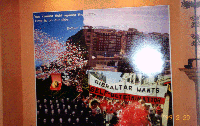 |
 |
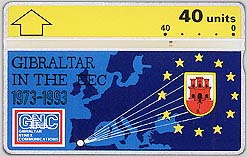 |
| Poster in the Gibraltar Museum celebrating the 1969 referendum | Stamps with Gibraltarian national costume - a new people and nation ? | Gibraltar hopes to use the EU as a counter-weight against Spain |
Solid As The Rock
Took the cable car up the Rock and here, one can see almost all of Gibraltar.
One realises how small it is. It used to be even smaller - the Gibraltarians
have reclaimed quite a fair part of the sea so as to provide adequate land
for development. The British Navy used to contribute 65% to the colony's
GDP but this percentage has fallen to 5%. Today, Gibraltar plays host to
4 million tourists and has emerged as an important offshore banking centre.
To further lessen its dependence on Spain, Gibraltar desalinates sea water,
and has built reservoirs within the Rock to store water.
 |
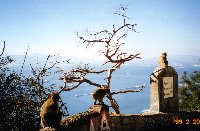 |
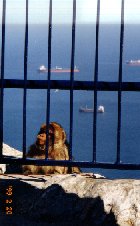 |
Like all tourists to Gibraltar, I took pictures of the Barbary Apes (Europe's only indigenous apes). Aggressive creatures they were, they hopped onto screaming visitors who came too close. These stubborn and arrogant creatures are masters of the Rock. They charged at anyone - regardless of their size - who intruded their territory. Perhaps, like their human counterparts in this tiny territory, they saw themselves as the manifestation of Goliath in his struggle against a much more powerful David. Hopefully, victory would be theirs.
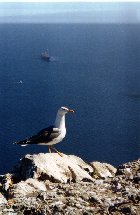 |
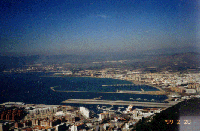 |
Also visited St Michael's Cave, with its classical music and stalagmites. I returned to the city after that, tried to find a dolphin cruise but discovered that I had missed the last cruise run of the day. I also discovered that the Main Street was now almost deserted. It was a Saturday and all the shops here close early, unlike their UK counterparts. Perhaps, like their Spanish neighbours, Gibraltarians are used to siesta too. However, I did notice a few local Jews on their way to the Synagogue. The Iberian Peninsula had long purged their Jews during the Inquisition, but Gibraltar, with its liberal, maritime traditions, have long seen the Jews as members of this territory, and here, they flourish and prosper.
I returned to the Little Chef restaurant in my last desperate attempt to find Gibraltarian cuisine. However, it had remained close and I had the British national dish - Indian curry - for dinner.